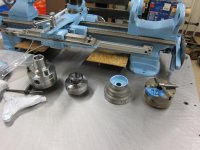I'm trying to understand how someone ends up with a lathe, yet has no tools to work on a lathe? I have always thought of a lathe as an extension of ones mechanical abilities, which generally means you have hand tools already? When I tore into my first lathe I was pretty clueless, and there was no internet for guidance, I had to drive 30 miles down the highway to talk to the grumpy old curmudgeon with a warehouse full of machines to figure out how several pieces came apart. Today with internet forums, youtube, and step by step tutorials with pictures, it seems to be a lot easier.
Note, I can understand paying someone to do the scraping if you are a novice, but disassembly, painting, reassembly is easy enough, and puts you in a position to really know your machine.
Edit: OP, there are numerous threads in the South Bend forum with all the info you need to disassemble, clean, inspect, and reassemble your lathe. Unless its completely worn out beyond acceptable limits, it does not need to be perfect to make good parts in a home shop. Use it as it is for now, learn to run a lathe and make parts, if you decide in the future you need something more precise, there are better machines out there.






